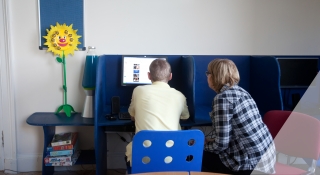Appropriate language
It can be challenging to find a common language that reflects the values and principles of autistic individuals across a very diverse spectrum as well as their families and professionals.
Language & Terminology
The Challenge
The complex nature of the autism spectrum gives rise to a range of personal and professional perspectives. It can therefore be a challenge to find a common language that reflects the values and principles of the various groups who are invested in advancing our understanding and support of people of all ages across a very diverse spectrum.
Scottish Autism aims to engage directly with autistic individuals and their families. Education, social work and health care professionals across all disciplines interact with the organisation in relation to specific individuals within our services or with a view to understanding how services need to develop better to respond to and support individuals with a diagnosis on the autism spectrum. Additionally, professionals within the organisation will engage with research and researchers from an equally broad range of disciplines.
The importance of terminology
Throughout our website the language and terminology used will reflect the diversity of the autism community and those invested in it whilst aiming to reflect the positive and inclusive ethos that underpins the work, values and philosophy of Scottish Autism.
Kenny et al (2015) found that the term “autistic” is preferred by adult individuals and their families whilst professionals tend to prefer terms such as “Individual with autism”. As an organisation we will endeavour to reflect the range of terminology that is preferred and used by those with a personal and or professional interest in autism.
The organisation is sensitive to the potential for perceived negative connotations in connection to terms such as “Disorder” or “Impairment”. These are clinical terms that are understood in such contexts and would be included in material of that nature or information that makes reference to same.
Scottish Autism understands that many individuals on the autism spectrum wish to assert themselves as neurologically diverse, as having a different way of being in, perceiving and engaging with the world and those they share it with. Such individuals would consider that being on the spectrum does not necessarily equate with impairment but can give rise to a unique world view, assets and skills. The organisation is respectful of this view and would support it whilst also acknowledging that some individuals on the spectrum face significant challenges in their daily living and are in need of high levels of support that is specifically tailored to their needs.
References:
Kenny L, Hattersley C, Mollins B, Buckley C, Povey C and Pellicano E. ( 2015) Which terms should be used to describe autism? Perspectives from the UK autism community. Autism 1 -21
Throughout our website the language and terminology used will reflect the diversity of the autism community and those invested in it whilst aiming to reflect the positive and inclusive ethos that underpins the work, values and philosophy of Scottish Autism.


